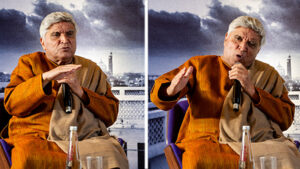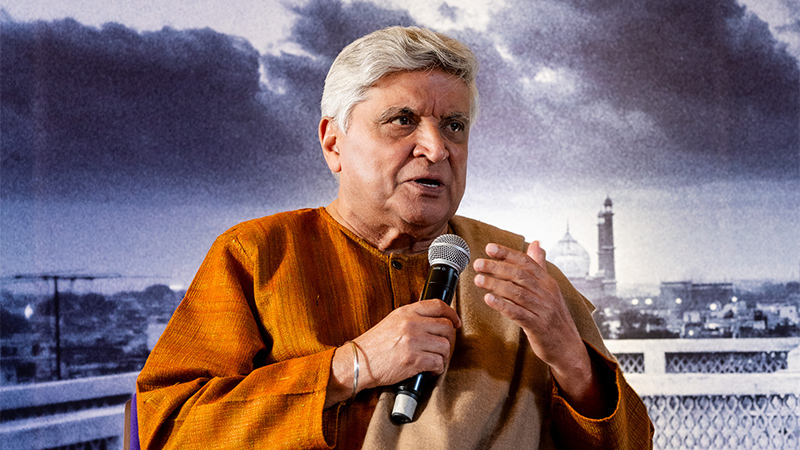Javed sahib – as he is often lovingly called – is an artist who knows how to work a room in his favour. So, it wasn’t surprising to see people of all ages gravitating to listen to the maverick at the Kiran Nadar Museum of Art, New Delhi.
Javed Akhtar, who has done almost 2,000 songs and more than 50 films, gave Hindi cinema the characters like the “angry young man” in Zanjeer, Kala Pathar and Deewar and Trishul, blockbuster films that earned millions at the box-office making the Salim-Javed duo celebrities overnight. “Artists are narcissists, so many similes they give to show their literary prowess,” he laughs. When he wrote these amazing characters, he admits he didn’t know they would become popular.
His quintessential style is unmistakable – a shawl loosely hanging from his shoulder, gravity-defying, to a silk kurta a bit long, with his eyes always searching the room. The poet and lyricist is also the author of books such as Jadunama and Talking Life. But his filmography is intense – from Border to Sholay and Laagan, he has won five National Awards.
The Padma Shri and Padma Bhushan awardee’s wit is evident when he says with a smile: “Life is transitional, everything is constantly changing and only dead people and fools are not part of this process.” Akhtar was born in Gwalior. His parents were from Awadh. He spent his formative years in Lucknow. And so, he is planning to pen a book on his interesting multicultural neighbors. He says, “Life was like a syrupy Hindi film, the mixture of culture was borderless. My neighbor, a Christian lady, spoke Lucknowi. I had no idea that Holi was a Hindu festival; my aunt used to make a jhaki for Janmashtami for children, and we used to enjoy toys made of sugar,” he says, adding that he got enormous love, as he was a child born into the family after 21 years.
While growing up, Javed admired Dilip Kumar and RajKumar, but what he was good at was voraciously reading. He calls himself a “chain reader”. He gave up the desire for acting and wanted to pursue directing. “Every magazine in the 1960s and 70s carried a column that wrote about a film personality on which their educational qualifications were mentioned. I wanted mine to be ‘graduate’, so I pursued my college degree,” he says.
He moved to Mumbai at the age of 20. His first job earned him Rs.50 a month. He then wrote dialogues for Kamal Amrohi for Rs.100 a month. There have been many turmoils in his life. He was out of job in the 1970s, till Ramesh Sippy hired him for Rs.750 a month. “I thought I had made it in life,” laughs Akhtar. Song and dialogue writers at that time were not paid very well, so Salim Khan and he embarked on a battle for both credit and money as “we had given them 12 superhits”.

Interestingly, he was shooting a film for Ashutosh Gowariker in Wai, Maharashtra, where he had to write a song about Ravan talking to Sita about Ram, and he exclaimed, “I told Ashu, the VHP will kill me.” But he did go on to write the song and later when he met a scholar of Sanskrit, he told Akhtar: “The song is fabulous and you have really understood Tulsidas’ verses.” “I was shocked, but maybe while growing up all the Ram Leela’s I saw and observed, I kind of soaked it all in,” says Akhtar.
Another such incident was during the filming of Yugandhar. Music directors Laxmikant-Pyarelal looked at Javed saheb uncomfortably, as he had to write on Krishna ji ki aarti. “I told them to give me a tune, and I would write it. And I did it using several names of Lord Krishna. Many do not know that Urdu poetry is written on Shiv Parvati and Krishna,” says Akhtar.
Akhtar believes language is the fulcrum of films, scripts in movies is what holds everything together. “Like the more shades you can give a painting, the more intense it looks, same is with words; thought is related to words, so you must have good words to communicate,” he adds. “Writers were not bankable, music and literature can’t be cashed,” he laughs, saying we have ignored our cultural heritage, classical arts, and folk music.
Affluent people, he explains, have books in their home to match their décor and they are brought in by the interior designer. “They want to match their leather couch to the book covers,” he laughs.
Though his anecdotal style of explaining how his life panned out is engaging, when he talks about his personality it is followed by laughs from his doting audience. “I wanted to buy a car when I started earning money. I never wanted a home. I had wall-to-wall carpet like rich people at home, when I bought my first one, not realizing that it was not ideal for Mumbai’s humid weather. But as it was a status symbol, I got it,” says Akhtar. Materialistic ambitions have spoiled our traditional beliefs, he admits, but the beauty of GenZ is that now they are wanting to find lost cultures.
Poetry, he believes, is the highest form of art, but Akhtar is courageous enough to say, he disagrees with the holy books of the world, and confesses that most poetry is “mediocre and an imitation of someone else.” “Henry Ford was a creative person as he decided to put the car on the conveyor belt; that is why he is a visionary, as it hadn’t been done before. “I believe creativity is sensitivity, and if you are normal and well-adjusted you won’t be creative,” he says, adding creativity is a combination of imagination and madness and is present in every art form – art, poetry, music interlaced with fantasy passion and romanticism, topped with craft and technique.

Your consciousness, he believes, is like the living room, but the subconscious is the attic, and you really do not know what is there, with ten billion neurons in the brain. “The real feeling is in the subconscious mind; it is a no man’s land. A good painter can surprise himself. If you give the best script to the best director no one will connect with the output,” he says.
Talking about the Hindi film industry, he adds cinema reflects our times, its morality, aspirations, and dreams. “Films are changing because society is changing, and directors want to please the audience and make money,” he adds, saying music and poetry are one, as poetry is music of language, and music is poetry of sound.
Like every writer, Akhtar also faces writer’s block, but he admits he loves writing film songs and is a maverick at working with deadlines, keeping in mind the situation that is given to him. “I do face blocks while writing my personal poetry, but I believe every human being is unique and that is what is one’s individuality. When you are born you get lifetime membership to human society. Before I check out of this membership, I want to contribute something,” he says.
People who can think clearly, Akhtar believes, have a good vocabulary, but in India many get impressed by verbosity and are intimidated by things they do not understand. “We don’t have neutral minds, we go and listen to people with a preconceived notion,” he says.
His spiritual beliefs are as individual as his poetry and he urges everyone not to treat communities as monoliths as “all types of communities have all types of people. “I gave my daughter a Russian name Zoya, based on an undercover agent who had killed this courageous fighter in Leningrad. I read about her in my school days. I told myself, if I had a daughter, I would name her Zoya,” he admits saying, his dad was a Communist. When he was born, rather than whispering the Azaan or verses from the Quran, in Akhtar’s ears, he read him the Communist manifesto. “I was called Jaadu as a kid, no one called me Javed,” he adds, mentioning that his last seven generations have been poets. “I started writing at the age of 31, and I knew I had to write well or not at all, considering my lineage,” he laughs.
His reasoning on human existence today is quite insightful when he mentions, “we are as insignificant as a blade of grass” and that finding out “who am I” is a futile pursuit as it is like peeling an onion, you will only get layers. “Everyone on this planet is playing multiple roles, like we do not know we are paying taxes, but we do. A woman is a mother, wife, daughter, friend, lover, she has so many roles, I cannot describe myself as one person,” he concludes. – Asmita Aggarwal is Fashion & Lifestyle Editor of Nrifocus.com


Leave a Reply